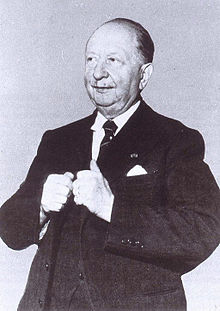Lucien Febvre
Lucien Febvre (born July 22, 1878 in Nancy , † September 26, 1956 in Saint-Amour , Département Jura ) was a French historian . Together with Marc Bloch , he founded the influential Annales School in history.
Life
His father was a high school teacher. During his studies at the École normal supérieure (1899-1902), Lucien Febvre was influenced by the historian Gabriel Monod , but especially by the geographer Paul Vidal de la Blache . In addition to studying history, he also attended lectures on geography, philosophy, literary and linguistics, and art history. In 1911 he received his doctorate with a thesis on Philip II and Franche-Comté - to which he also dedicated two of his next works - and then got a position at the University of Dijon . After taking an active part in the First World War , he moved to the University of Strasbourg in 1919 . His important work La Terre et l'évolution humaine (The Earth and Human Evolution) appeared here, in which he dealt with the field of human geography and in particular criticized some of the theses of Friedrich Ratzel . In 1920 he met Marc Bloch at the University of Strasbourg, with whom he exchanged and worked closely on almost every day until 1933.
In 1933 Febvres was appointed to the Collège de France . Together with Anatole de Monzie, he founded the 20-volume Encyclopédie française (1935–1966), which is not an alphabetically structured encyclopedia , but aims to make scientific connections clear through a thematic breakdown. Fernand Braudel is considered to be his most important student .
As part of the Annales School , Febvre particularly shaped the history of mentality . His aim was to contextualise high and popular culture with the help of related sciences such as sociology , ethnology , linguistics and geography. In 1941, for example, he treated the connection between sensitivity and history in an essay that included psychological, linguistic and behavioral methods. This interdisciplinary expansion of historical science should make a more effective analysis of entire societies possible ( histoire totale ). On the basis of individual studies, Febvre also researched the intellectual and mental history of the age of the Reformation , in particular in his books on Martin Luther (1928) and François Rabelais' understanding of religion (1942).
estate
An extensive collection of Febvre's papers has been available for research since 1998 and has been in the National Archives since 2017 .
Fonts (selection)
- Philippe II et la Franche-Comté. Étude d'histoire politique, religieuse et sociale. Champion, Paris 1912. New edition Paris 2009, ISBN 978-2-262-01519-0 .
- Notes and documents on the Réforme et l'Inquisition en Franche-Comté. Champion, Paris 1911.
- Histoire de la Franche-Comté. Boivin, Paris 1912.
- La Terre et l'evolution humaine. Albin Michel, Paris 1922.
-
Un Destin: Martin Luther . Rieder, Paris 1928.
- In German translation as Martin Luther . Ed., Translated and with an afterword by Peter Schöttler . Campus, Frankfurt am Main 1996, ISBN 3-593-35467-5 .
-
The problem of the incroyance au 16e siècle. La religion de Rabelais. Paris 1942.
- In German translation as The Problem of Unbelief in the 16th Century. The religion of the Rabelais . With an afterword by Kurt Flasch. Translated from the French by Grete Osterwald. Klett-Cotta, Stuttgart 2002, ISBN 3-608-91673-3 .
- with Albert Demangeon : Le Rhin. Problèmes d'histoire et d'économie. Armand Colin, Paris 1935.
- In German translation as The Rhine and its history . Ed., Translated and with an afterword by Peter Schöttler. Campus, Frankfurt 1994, ISBN 3-593-35152-8 .
-
Amour sacré, amour profane. Autour de l'Héptaméron. Gallimard, Paris 1944.
- In German translation as Margaret of Navarra (1128–1183). A queen of the Renaissance between power, love and religion . Ed., Translated and with an afterword by Peter Schöttler. Campus, Frankfurt 1998.
- The historian's conscience . Edited and translated from French by Ulrich Raulff , Wagenbach, Berlin 1988, ISBN 3-8031-3539-7 . Fischer Taschenbuch, Frankfurt am Main 1990, ISBN 3-596-10332-0 .
- The curious look. Life in the French Renaissance . With a foreword by Peter Burke. Translated from the French by Gabriele Ricke and Ronald Voullié. Wagenbach, Berlin 1989, ISBN 3-8031-2171-X . New edition 2000, ISBN 3-8031-2385-2 .
See also
literature
- Michael Erbe : On the more recent French social history research. The group around the "Annales" (= income from research; Vol. 110). Wissenschaftliche Buchgesellschaft, Darmstadt 1979, ISBN 3-534-07551-X , esp. Pp. 35-39.
- Peter Schöttler : The "Annales" historians and German history . Mohr Siebeck, Tübingen 2015, ISBN 978-3-16153-338-9 .
Individual evidence
- ↑ Peter Burke : The story of the "Annales". The emergence of the new historiography. Wagenbach, Berlin 2004, p. 23.
- ^ Nicole Racine (1998): Lucien Febvre et l 'encyclopédie française ( online )
- ^ Brigitte Mazon: Archives de Lucien Febvre. January 25, 2017, accessed on January 5, 2019 (fr-fr).
Web links
- Literature by and about Lucien Febvre in the catalog of the German National Library
- List of estates of the Archives Nationales, Fonds Lucien Febvre on pp. 11–13. (PDF; 179 kB; French)
- Font directory
| personal data | |
|---|---|
| SURNAME | Febvre, Lucien |
| BRIEF DESCRIPTION | French historian |
| DATE OF BIRTH | July 22, 1878 |
| PLACE OF BIRTH | Nancy |
| DATE OF DEATH | September 26, 1956 |
| Place of death | Saint-Amour , Jura department |
